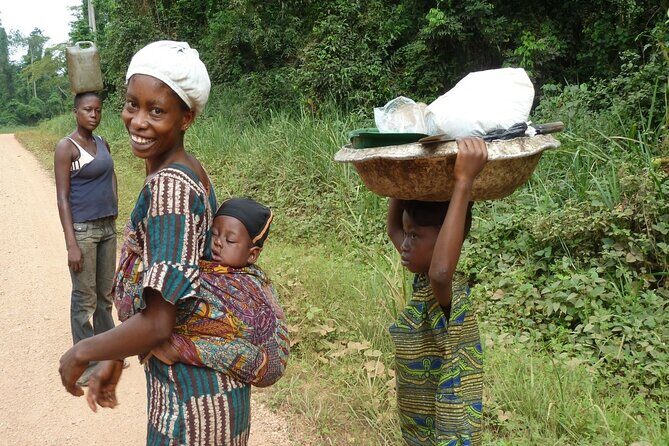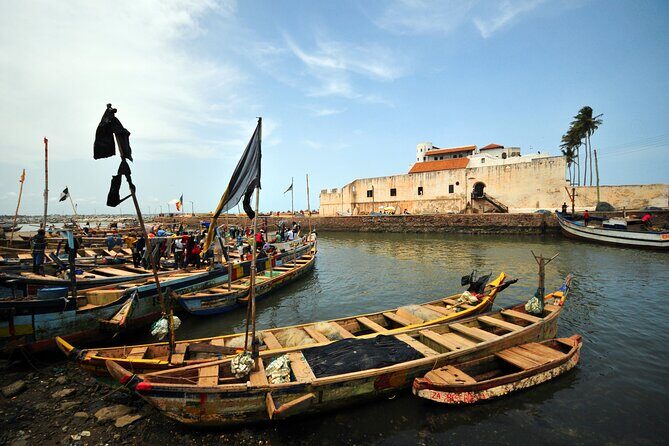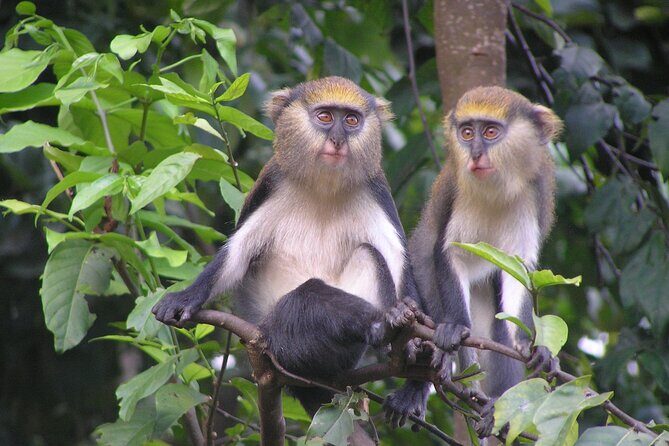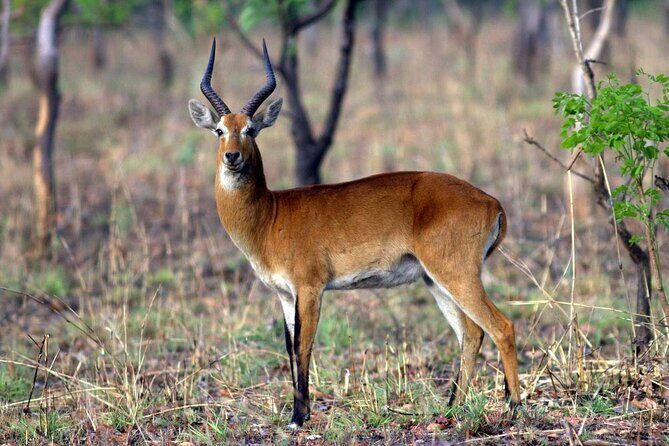Getting a true taste of Ghana isn’t something you do in a day. This 9-day Wildlife and Culture Tour offers a comprehensive look at everything that makes this country so captivating—history, bustling markets, lush national parks, and lively communities. While it’s a hefty investment at nearly $4,700 per person, many travelers find that the experience’s depth and authenticity make it worth every penny.
What makes this tour stand out? For starters, expert local guides who genuinely love sharing their homeland, well-structured itineraries that balance wildlife encounters with cultural insights, and stunning scenic views that stick with you long after the trip ends. The downside? The extensive schedule means quite a bit of flying and travel time, so it’s best suited for those who enjoy a full, immersive experience rather than a leisurely holiday. If you’re keen on exploring Ghana’s multifaceted personality—from its history and vibrant markets to its incredible wildlife—this tour could be just what you’re after.
- Key Points
- The Itinerary in Detail
- Day 1 & 2: The Heart of Accra – Culture and History
- Day 3 & 4: Wildlife Encounters in Mole National Park
- Day 5 & 6: Cultural Heritage and Craftsmanship
- Day 7 & 8: From Slave Trade to Rainforests
- Day 9: Reflection and Departure
- The Experience’s Balance: What We Love & What to Consider
- Who Is This Tour Best Suited For?
- Frequently Asked Questions
- Final Thoughts
- More Tours in Accra
- More Tour Reviews in Accra
- Still browsing? Here are more Accra experiences we've covered recently
Key Points

- Authentic local experiences with knowledgeable guides who bring Ghana’s culture to life
- Diverse itinerary blending history, wildlife, and cultural traditions
- Comfortable transportation in air-conditioned vehicles with airport transfers included
- Balanced schedule with opportunities for relaxation and exploration
- High customer ratings reflecting satisfaction with guides, scenery, and overall value
- Price point reflects the comprehensive nature of the trip, offering excellent value for those seeking depth
The Itinerary in Detail
Here are more experiences we've reviewed in Accra
Day 1 & 2: The Heart of Accra – Culture and History
Your journey kicks off at Kotoka International Airport, where guides from Ashanti African Tours will be waiting with a welcoming smile and a sign. From there, the first impressions of Accra—its lively streets, vibrant markets, and historic sites—are meant to set the tone. Staying in the city, you’ll appreciate the convenience of a centrally located accommodation and the ease of transportation.
On Day 2, the tour dives into Ghanaian culture and history. The National Museum of Ghana is an ethnographic treasure trove, featuring displays from across West Africa. It offers an overview of the traditions, history, and crafts that shape the region. Reviewers mention a particular appreciation for the adjoining sculpture garden, which “talks about West African tradition and customs,” and note that visitors can purchase beautiful fabrics and crafts here—an excellent way to support local artisans.
Next, a walking tour through James Town introduces you to Accra’s oldest neighborhood. The colonial-era structures and lighthouses built in 1871 evoke a sense of the city’s past, and visits to Fort James and Fort Christiansborg provide tangible links to the colonial and trading history. The 30-meter-high lighthouse is a highlight for many, offering stunning views and photo ops.
Lunch at a local restaurant named Country Kitchen allows you to sample West African dishes alongside more familiar continental options. The afternoon continues with visits to Independence Square and Kwame Nkrumah Memorial Park, where the story of Ghana’s independence and its founder comes alive. Reviewers emphasize how these sites “offer an insightful glimpse into the nation’s dark past and hopeful future,” with the park’s Italian marble and lush gardens being particularly praised.
The day wraps with a visit to Teshie’s Fantasy Coffins, where local artisans craft coffins in shapes that reflect the deceased’s life—be it a car, airplane, crocodile, or even a cocoa pod. This unique tradition is both solemn and celebratory, and visitors often find it a fascinating insight into Ghanaian beliefs about life and death.
Day 3 & 4: Wildlife Encounters in Mole National Park
After a morning flight to Tamale on Day 3, the focus shifts to Ghana’s largest national park, Mole. Here, the landscape opens to savannahs, watering holes, and forested areas that are home to nearly 100 mammal species and over 330 bird species. Staying on an escarpment overlooking the park, you’ll enjoy breathtaking vistas and the chance to relax by the pool while observing elephants bathing below—an experience many reviewers describe as “magical.”
Day 4 is dedicated to tracking Africa’s giants. Armed guides take you on foot to find elephants, with some reviewers mentioning how “getting close to these gentle giants” is a highlight. It’s an active day, with morning tracking hikes that can last up to four hours, offering a rare opportunity to see elephants, primates, and antelopes in their natural habitat.
In the afternoon, a visit to the nearby Mognori village offers a different perspective—learning about sheep butter production, local medicinal plants, and community life. The river safari in a dugout canoe adds a tranquil, wildlife-focused finale to the day, where birdlife and possibly more mammals make appearances.
Reviewers, like one who said “the guides were knowledgeable and made the wildlife come alive,” highlight how engaging and educational these park visits are. The park’s varied terrain and the chance to see animals in their natural settings make this a wildlife lover’s dream.
Day 5 & 6: Cultural Heritage and Craftsmanship
Traveling south, Day 5 involves an early start with a flight to Kumasi. The journey is a mix of scenic drives and cultural stops. The Kintampo Falls offers a refreshing break—its powerful flow and small swimming pool make it an enjoyable detour, especially since it’s a great spot for a quick swim to cool off.
Next, the Boabeng-Fiema Monkey Sanctuary provides a chance to see sacred monkeys—Black and White Colobus and Mona monkeys—that are revered and protected by local communities. Visitors often comment on the genuine interaction with locals and the educational aspect of seeing how these animals are integrated into daily life.
In Kumasi, the Ashanti Empire’s last remaining structures offer insight into traditional architecture and the famous Adinkra symbols. Visiting Adanwomase reveals the craftsmanship behind Kente cloth weaving, with artisans demonstrating their skill, and some reviewers note that “walking through the community, you get a real sense of how important these textiles are to Ghanaian identity.”
The Ntunso village is where adinkra symbols originated—carved into calabash shells and printed onto cloth. Making your own adinkra strip adds a personal touch, and visitors appreciate the chance to connect with Ghanaian traditions firsthand.
Later, brass casting in Sokoban Krofrom showcases another local craft that’s been passed down through generations. Watching artisans at work and shopping for souvenirs makes these visits both educational and rewarding.
Day 7 & 8: From Slave Trade to Rainforests
The trip continues south to Elmina, with a poignant stop at Assin Manso, a key site along the slave trade route. Many reviewers mention feeling moved by the historical significance of the Cape Coast Castle, recognized as a UNESCO World Heritage Site. Walking through the dungeons and the Door of No Return leaves a lasting impression, and the museum details make it clear that this was a turning point in West African history.
On Day 8, the option to relax or explore the Kakum National Park provides a perfect balance. The rainforest canopy walkway is a highlight—suspended 40 meters above the ground, it offers spectacular views of the rainforest and a chance to see primates, butterflies, and birds up close. Reviewers mention that “walking across the bridges felt like floating in the treetops,” making it a memorable adventure.
Close by is the International Stingless Bee Centre, where you can learn about the ecological importance of bees, taste honey, and enjoy the butterfly garden. The visit to Cape Coast concludes with a batik-making workshop—a hands-on activity that allows you to craft your own fabric while engaging with local artisans.
The day ends with a visit to Elmina’s fishing harbor and boatbuilders, providing a lively, authentic snapshot of coastal community life.
Day 9: Reflection and Departure
The last day is relaxed—many travelers choose to enjoy the hotel amenities or stroll along the beach. A visit to Fort Amsterdam in Abandze offers a glimpse into Ghana’s colonial past before heading back to Accra.
In the late afternoon, there’s time for last-minute shopping at the Accra Mall, an opportunity to pick up souvenirs and experience modern Ghana. The tour concludes with a farewell dinner at a local restaurant, giving you a chance to reflect and enjoy Ghanaian cuisine one final time before your transfer to the airport.
The Experience’s Balance: What We Love & What to Consider

What really makes this tour shine is the combination of expert-guided cultural insights and close encounters with wildlife. The guides—like Foster, who’s praised for his passion and knowledge—are critical to making each site meaningful, and many reviewers mention how engaged and caring their guides were.
The transportation is comfortable, with air-conditioned vehicles and reliable airport transfers, helping keep the long travel days manageable. The flights between Accra and Tamale add to the adventure, saving time and allowing more focus on the sights.
Pricing reflects the comprehensive nature of the tour, including accommodation, meals, all excursion fees, and expert guides. For those seeking an immersive experience that balances history, culture, and wildlife, the value delivered is substantial.
However, the intensive schedule does mean some days are packed with activities, and travelers should be prepared for early mornings and long days. The tour’s focus on authentic experiences and local interactions might not appeal to those looking for a more relaxed holiday.
Who Is This Tour Best Suited For?

This tour is ideal for adventure seekers and culture enthusiasts who want an in-depth look at Ghana. It’s perfect if you enjoy active days, wildlife safaris, and engaging with local communities. Those interested in history will appreciate the visits to castles and slave trade sites, while nature lovers will love the park excursions.
It’s also well-suited for travelers who value knowledgeable guides and are comfortable with a fast-paced schedule. If you like to see a lot in a short amount of time and want to truly understand Ghana’s diverse landscape and people, this tour will meet your needs.
Frequently Asked Questions

Is this tour suitable for all ages?
Since the itinerary involves early mornings, walking, and wildlife tracking, it’s best for active adults and older children who can handle the pace.
Are meals included?
Yes, breakfast and dinner are provided every day, along with eight lunches. Many reviews mention the delicious local dishes served throughout.
What about accommodation?
The package covers accommodation, typically in comfortable hotels or lodges, with some offering scenic views of parks or cityscapes.
How is transportation arranged?
A private, air-conditioned vehicle is used for transfers and excursions, ensuring comfort during long drives and city sightseeing.
Can the trip be customized?
Since it’s a private tour, there’s room for some tailoring based on your interests or needs, but the core itinerary is fixed.
What is the main highlight of the wildlife safaris?
Seeing elephants up close in Mole National Park is a standout experience, along with spotting other mammals, birds, and enjoying boat safaris.
Is this tour safe?
Ghana is considered one of the more welcoming and safe African countries for travelers. The tour includes local guides and structured activities for peace of mind.
How physically demanding is the trip?
Expect some walking, wildlife tracking, and boat rides, but guides are experienced in managing activities suitable for most fitness levels.
What is the best time of year to take this tour?
While not specified, generally the dry season (November to March) offers better wildlife viewing and comfortable weather.
Final Thoughts

The 9-Day Ghana Wildlife and Culture Tour offers an immersive, well-rounded experience that covers everything from bustling markets and historic forts to national parks and traditional crafts. It’s a fantastic choice for travelers eager to see Ghana beyond the surface—those who want to connect with locals, learn about history, and witness the country’s diverse ecosystems firsthand.
With knowledgeable guides, seamless logistics, and thoughtfully curated activities, this tour provides solid value for its price. It’s best suited for energetic, curious travelers ready for a full-immersion adventure into Ghana’s heart and soul.
Whether you’re a wildlife enthusiast, a history buff, or someone simply craving authentic cultural encounters, this tour promises a deep dive into all that Ghana has to offer.
Note: Given the positive reviews emphasizing guides, scenery, and cultural depth, travelers can expect a memorable, enriching experience that highlights Ghana’s vibrancy and authenticity.
More Tours in Accra
More Tour Reviews in Accra
Still browsing? Here are more Accra experiences we've covered recently
- Explore Aburi Botanical Gardens And Boti Falls
- Accra to Aqua Safari Resort Eco-Friendly Tour with Meal
- African Naming Ceremony
- Accra: Cocoa Farm & Waterfalls Tour
- ACCRA GUIDED CITY TOUR, GHANA
- Accra Slave Tour
- Traditional Beadmaking Workshop
- 10 Days Heritage, History and Adventure Tour in Ghana
- Accra: Whirlwind Guided City Tour by Car with Entry Fees
- Accra: Guided 10-Day Panafest Festival 2025 Tour
- From Accra: The Cape Coast Day Tour Guided Experience
- Ghana: 3 Days Sightseeing
